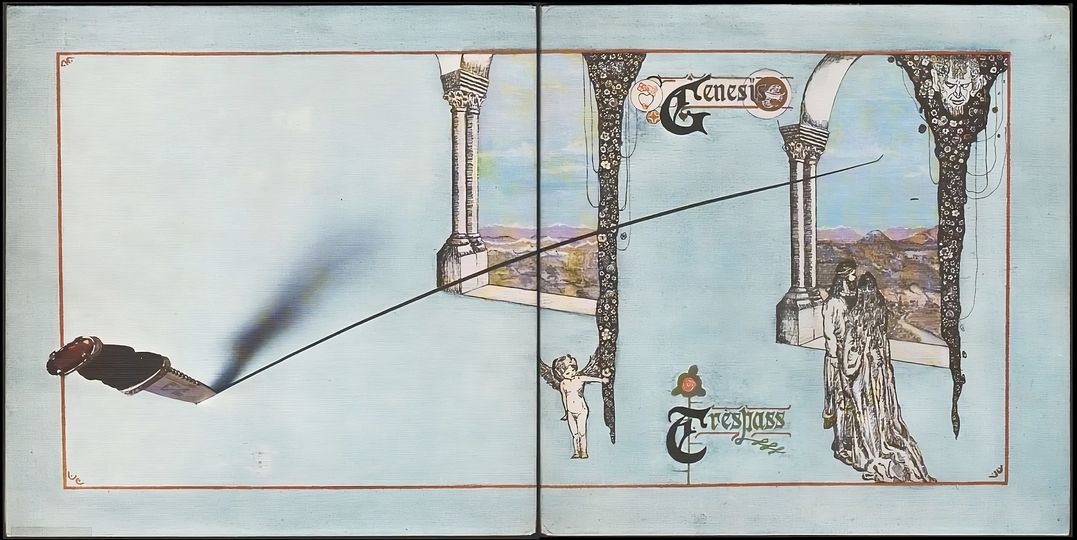GENESIS first album, “From Genesis To Revelation“ (1969), was still teenage boys fumbling around with bland pop, but with Trespass the band took a giant leap forward.
Genesis’s debut album, *From Genesis to Revelation* (1969), presents a fascinating snapshot of a young band still in its formative years. The album, characterized by its melodic pop tunes and pastoral lyrics, reflects the musical landscape of the late 1960s but lacks the distinctive edge that would later define Genesis. It features simple, unremarkable arrangements and is primarily driven by the band’s then-teenage innocence. The songs are pleasant but lack the complexity and sophistication that would become hallmarks of Genesis’s music in their later years.
*From Genesis to Revelation* is often remembered for its conventional approach to pop music. The tracks are imbued with a naive charm, and the band’s early influences are evident in the songwriting. It is a collection of melodic, albeit uninspired, songs that are often compared to the early work of other pop and rock bands of the era. The album’s production is clean, but it does little to showcase the potential that would emerge in later years.
The turning point for Genesis came with their second album, *Trespass* (1970), which marked a significant departure from their debut. The transformation was not merely incremental; it was a radical shift that signaled the beginning of the band’s evolution into one of the most influential progressive rock acts of the 1970s. *Trespass* was a bold step into more complex and ambitious territory, both musically and thematically.
The key to understanding this leap lies in the musical and lyrical development seen in *Trespass*. Unlike their debut, *Trespass* embraces a more intricate and layered approach. The album is characterized by its use of extended compositions, complex time signatures, and a more ambitious use of dynamics and arrangement. This evolution reflects a deeper understanding of musical structure and an increased willingness to experiment with form and content.
One of the standout tracks, “The Knife,” epitomizes this new direction. It combines intricate guitar work with a driving rhythm, showcasing the band’s ability to create tension and release within their music. The song’s aggressive tone and complex structure were a stark contrast to the more straightforward pop of their debut. It also highlighted Peter Gabriel’s burgeoning skill as a lyricist, as his words began to delve into darker, more narrative-driven themes.
Similarly, “Stagnation” offers a more contemplative and atmospheric experience, with its progressive tendencies and lyrical depth. The song’s shifting dynamics and intricate instrumentation signal a maturity that was absent from their earlier work. The track’s reflective quality and the band’s sophisticated handling of tempo and mood indicate a significant development in their musical capabilities.
The album also marked a shift in the band’s lineup, with guitarist Anthony Phillips and keyboardist Tony Banks becoming more prominent in shaping the band’s sound. Their contributions were instrumental in steering Genesis towards a more progressive rock style. The introduction of new textures and timbres added layers of complexity to their music, setting the stage for the elaborate compositions that would come to define their later work.
*Trespass* also saw a more pronounced focus on thematic and conceptual elements. The album’s lyrics and musical motifs reflect a fascination with storytelling and complex themes, moving away from the straightforward love songs of their debut. This thematic richness is evident in tracks like “The Musical Box,” which combines intricate musical ideas with a narrative approach, hinting at the epic storytelling that would become a hallmark of Genesis’s future albums.
The shift from *From Genesis to Revelation* to *Trespass* illustrates not just a change in musical direction but a deeper evolution in the band’s artistic vision. The early Genesis sound was characterized by its earnestness and simplicity, but *Trespass* introduced a more ambitious and sophisticated approach that would lay the groundwork for their future successes. The album’s departure from their pop origins towards a more progressive and complex sound marked the beginning of Genesis’s journey towards becoming one of the defining bands of the progressive rock genre.
In summary, *Trespass* represents a crucial turning point in Genesis’s career, showcasing a dramatic evolution from the more conventional pop of their debut. The album’s intricate compositions, thematic depth, and musical experimentation laid the foundation for the band’s future success and established them as a pioneering force in progressive rock. The leap from *From Genesis to Revelation* to *Trespass* is a testament to the band’s growth and an early indication of their potential to push the boundaries of rock music.
